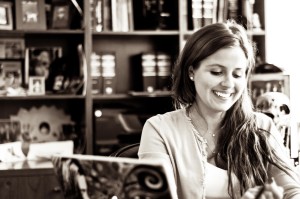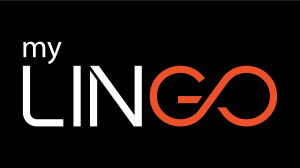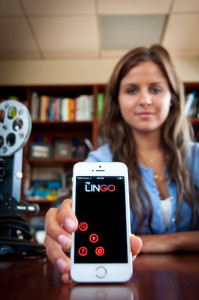myLINGO | Connecting Non-English Speakers with the Movies
 TechZulu recently sat down with east coast transplant Olenka Polak to talk about startup life in Los Angeles. myLINGO is the first product of her company Oladas, Inc., her joint effort with her co-founder and brother, Adam Polak.
TechZulu recently sat down with east coast transplant Olenka Polak to talk about startup life in Los Angeles. myLINGO is the first product of her company Oladas, Inc., her joint effort with her co-founder and brother, Adam Polak.
Just 20 years old and a recent Harvard University dropout, Olenka provided insight into her transition to Los Angeles, life as an entrepreneur, and how she’s passionate about helping non-English speakers see American movies in their own native language.
Explain to our readers why you started your company, and why you created your app myLINGO. What problem were you trying to solve?
OP: It was 2012 when my brother and I took our cousin who was visiting from Poland to go see the movie Hugo. After coming out of the movie, my brother and co-founder Adam (Polak) and I loved it, but our cousin did not. Our cousin said he didn’t like it because he didn’t understand it. He said in Poland he watched American movies that were dubbed in Polish, and that’s how he understands the movie.
So we thought about this problem and asked ourselves a lot of questions like, “What happens to the language displaced individual — somebody who is either temporarily or permanently in a country where the language spoken is not their native language? How can they go to the movies? Where can they access these movie audio dubs?” What we found is that there was no present solution to do this. There was no way to separate the audio from the visual component of the film. And that’s the problem that we are trying to solve with myLINGO.
How does myLINGO work from a consumer’s point of view?
OP: myLINGO is a smartphone app where you can select and download an audio track of a movie in your preferred language and go to the theatre and have that audio track synchronize to the movie playing on the screen. The idea is that the app uses the onboard microphone, reads the movie at any point the movie is playing using acoustic finger printing and audio recognition. You have the headphones in your ears and you listen to the whole track, the dialogue, surround special effects, and music tracks as you are watching the movie on the screen.
How did you go from Point A being ‘we recognize this as a problem’ to Point B being ‘we’re working towards a solution to solve this problem?’
OP: Of course we had to do a lot of research to figure out if this was a viable solution. What we had to figure out was is the length of the alternative language tracks the same length as the original format track? Has this sort of idea been around and was it not executed because of some sort of a technical issue? We did a lot of investigative research — cold calling executives in Hollywood through networks at Harvard and networks through Johns Hopkins, the school where my brother graduated from. All these efforts were to figure out what it would take to put something like this in the market.
You and your brother recently launched the myLINGO app alongside Pantelion’s film Cesar Chavez. Share with our readers your experience surrounding the launch of the app.
OP: When the sync first worked in early 2013 we were testing it with Toy Story 3 in Spanish and English, and the first words of Toy Story 3 in the Spanish version are “Dinero, dinero, dinero!” I will always have that branded in my brain as the first moment and thinking wow, we actually built something that really works — the phone is separate from the computer and these 2 things are synchronized. I thought that it was incredible!
But this feeling sort of dies out when you’re working with the product every day, and talking about your product every day. Why I’m mentioning this is that when we released the app for Cesar Chavez this year, I saw the app in a live setting. People had never seen a product like this before, never heard of myLINGO before using it, and their eyes sort of widened when the first sync kicked in with the first couple of words spoken on screen. It was great to relive a moment when I was in my dorm room at Harvard and watching Toy Story 3 on my laptop and seeing something that we built with no cash, just sweat equity. Now people are using it – it’s been incredible. We took this into a live setting – and we’re very proud of that.
Explain to our readers what you learned from seeing myLINGO in action. What type of user research were you able to gain from the experience?
OP: During the launch we had to do some consumer education where we had to teach people how to use the app, and this involved creating new behaviors such as bringing headphones to theatres, downloading the audio track beforehand, understanding that they had to put their phone away as to not disturb someone next to them – those sort of things. We will need to keep on figuring out how to educate our consumer.
Post launch, we are also looking at business aspects – for example, the fact that we need to involve the movie theatres in a larger way. I mean, we’re new to this town and new to this industry – so just a lot of things came up during the launch that we’re now looking into.
What has been the biggest milestone the company has achieved so far?
OP: Putting together our A Team. I mean, we now have Warren Lieberfarb as our Chairman. Mr. Lieberfarb is the Chairman of Warren N. Lieberfarb and Associates and he was the one who pioneered the DVD – the DVD format that we all know and we all have used tons of times. We also have Chris Cookson as a technical advisor. He’s a former President of Sony Pictures Technologies and former CTO of Warner Bros. Entertainment. He’s our sounding board for technical operations, specially with content protection. Jeremy Zimmer, the CEO of United Talent Agency (UTA) – he’s our advisor as well. Having these true believers on board and getting their help in putting something like this into market is a pretty big milestone for our team.
You’ve been in school for most of your adult life, and this role of being an entrepreneur is relatively new for you. Can you share with our readers how you came to define or identify yourself as an entrepreneur?
OP: This is not like a job – it’s not 9 to 5. You’re basically working 24 hours. Things can happen in the middle of the night and you have to attend to it because if you don’t no one else will. So being an entrepreneur is a lot like being a student. As a student you’re sort of 24 hours around the clock. If you put off doing a paper, you have to stay up all night and finish that paper. You have deliverables. You’re working with a crazy schedule where your classes are scattered throughout the day, just like meetings are scattered throughout the day, so it is a life switch, but the schedule is still as hectic as it was as a student.
I had a pretty solid transition point – my last semester at school, I really wasn’t doing school. I was just working on the company. I‘d fly out to LA every 2 to 3 weeks. I’d have to hand in problem sets early. Skip classes. I’d write to my professors and say “I’m so sorry, I have this meeting or I had this phone call that I had to take.”
I had about a solid semester of transitioning, where I was actually working on my company fulltime. I was not being a student. I was disrespecting my professors and my fellow peers. I should be at school to learn and right now I’m learning a different way and it’s outside of the classroom. One day when I have the time to learn inside the classroom, I’d love to go back at some point, but for now I’m focused on myLINGO.
myLINGO is designed to bring new users into the movie viewing experience. How can film and distribution companies increase their revenues by utilizing the myLINGO platform?
OP: Well, right now there is a totally underserved market of language displaced individuals, as I mentioned earlier. So, the uplift in ticket sales from having this sort of app available for any movie title playing in the theatres is instantly a positive for film distributors and studios. We are still working on the business model but it seems that they are going to be able to participate in the actual transaction between the consumer paying for the dubbed audio track – and the split between the revenue there.
How did you come up with the name for your company? What was your process to create naming options, how did you vet options, and how did you test them?
OP: We were under a time restriction, we didn’t have a whole lot of time to spit out a name. The name Oladas which is our company name – we had to come up with that in one night. We had to file our articles of incorporation for the company the following morning and so we took my Polish nickname which is Ola and we took my brother’s Polish nickname Adas and mushed them together. We decided on LINGO for our product but there was a trademark issue with it so we went with myLINGO.
myLINGO is utilized by both businesses (film studios and distributors) and consumers. The film studios/distributors are an avenue for consumer adoption, but consumers can also create demand for your app. How are you trying to create dialogue with individuals who are your target market, and what do you want to happen going forward?
OP: What’s interesting is that when studios market a movie they have a whole multi-cultural campaign. We are working toward having synergistic relationships with these multi-cultural marketing folks because myLINGO is clearly a utility that will actually drive traffic to the movie instead of just buzz.
Another thing too – my parents have iPhones, but the only apps on their iPhones have been downloaded by my brother, me, and my sister. We actually want to target our messaging directly to people like us — bi-cultural millenials. We’re trying to target kids like us who can influence the adoption process.
We have many entrepreneurs here in Los Angeles, many of whom are working in the entertainment sector. What advice would you share to tech entrepreneurs who want to work with the film studios?
OP: I actually think the best thing to do is to close your eyes, plug your nose, and just take a cannonball right in because that’s the only way that I think people can actually make change happen. If I was intimidated in any way from the very beginning I wouldn’t have made those cold emails and cold phone calls. I wouldn’t have asked people to work for us on sweat equity. I wouldn’t have asked those things because I think my naiveté was hugely beneficial to the startup of this company. As much as I sometimes wish “oh, if only I knew” I’m really glad that I just jumped in. You learn by doing. So I don’t know – when people approach me and say they are thinking of doing something and they ask if I should do it, I say absolutely go for it. Say ‘yes.’ It may seem counter-intuitive but I do believe in it.
What do you think has been the single best lesson that you’ve learned so far?
OP: Culture. Setting culture. This can be on a micro-scale or on a macro-scale. Company culture as a whole. Communication. Having everyone be on an equal playing field – all that stuff but on a micro level. For example, if you email somebody and they email you back, or they don’t follow up or it’s a few days late or you don’t answer the questions when you respond back, you’re setting a culture between you and this person where there isn’t liability or full disclosure or something like that. You could tarnish a relationship or no longer have that connection because you set a culture where you no longer respond in a good way. Why I am saying this is important because I actually experienced it when back in the beginning when we were trying to get consultants together, I was so overwhelmed I wasn’t necessarily really responding in time, or not giving them clear direction. I learned from that, and now I set culture to be responsive, helpful, very much like open book– I think personal relationships are huge and I think firming them up from the very beginning is really important.
If you looked at the entrepreneurial community today, is there any one person that stands out to you as having an exceptionally admirable career path? And why?
OP: Who I look up to the most is Jeffrey Bewkes. He is the Chairman of the Board and CEO of TimeWarner. And why I really appreciate him as an entrepreneur is because he has sort of had an entrepreneurial career within large corporations. It’s hard to take on a lot of risks and spearhead a lot of different projects within big corporations – but he did that at HBO, Warner and now at TimeWarner. I really respect his career path – he is a guy who cared less about his own job security and more about the actual growth of the big company.
When I was in high school I actually sent him a letter when he was at HBO asking him if I could intern at HBO. Then I got a letter back from HBO that said that you had to be over 21 in order to intern at HBO. But I don’t know, it’s kind of funny how I may be doing business with one of his subsidiaries in the very near future, and 4 years ago I was a high school kid sending off a letter and looking up to him. Who knows, maybe I’ll be sitting across the table one day doing business with him — which is kind of inspiring. | Images via Juan Monsalvez









